I understand that the mission of outfits like the Teatro Donizetti is to “rescue” forgotten operas but, frankly, some of them ought to remain forgotten. I would put Donizetti’s Alfredo il Grande in that category. It premiered in Naples on 2nd July 1823 and closed after one disastrous performance not to be seen again until a run in Bergamo in November 2023 which was recorded for video.
 It’s loosely based on the story of Alfred hiding out in the Somerset levels then emerging to defeat the Great Heathen Army at Edington in 878. Curiously the part of the story which “everyone knows” (probably the only bit of Anglo-Saxon history most English people do know); the burning of the cakes, is not included. The plot is basically that Alfred is hiding out with a shepherd, Guglielmo. His wife Amalia (not Ealswith) and his general Eduardo go looking for him but are tailed by the Danish leader, Atkins (not Guthrum). They escape via an underground tunnel (in a swamp!), link up with the soldiers Eduardo has gathered together and defeat the Danes. While escaping from the battle Atkins captures Amalia and her sidekick Enrichetta but the English show up just in time and rescue them. All hail Alfred! No mention of the deal to let the Danes settle in East Anglia or Guthrum’s conversion to Christianity.
It’s loosely based on the story of Alfred hiding out in the Somerset levels then emerging to defeat the Great Heathen Army at Edington in 878. Curiously the part of the story which “everyone knows” (probably the only bit of Anglo-Saxon history most English people do know); the burning of the cakes, is not included. The plot is basically that Alfred is hiding out with a shepherd, Guglielmo. His wife Amalia (not Ealswith) and his general Eduardo go looking for him but are tailed by the Danish leader, Atkins (not Guthrum). They escape via an underground tunnel (in a swamp!), link up with the soldiers Eduardo has gathered together and defeat the Danes. While escaping from the battle Atkins captures Amalia and her sidekick Enrichetta but the English show up just in time and rescue them. All hail Alfred! No mention of the deal to let the Danes settle in East Anglia or Guthrum’s conversion to Christianity.
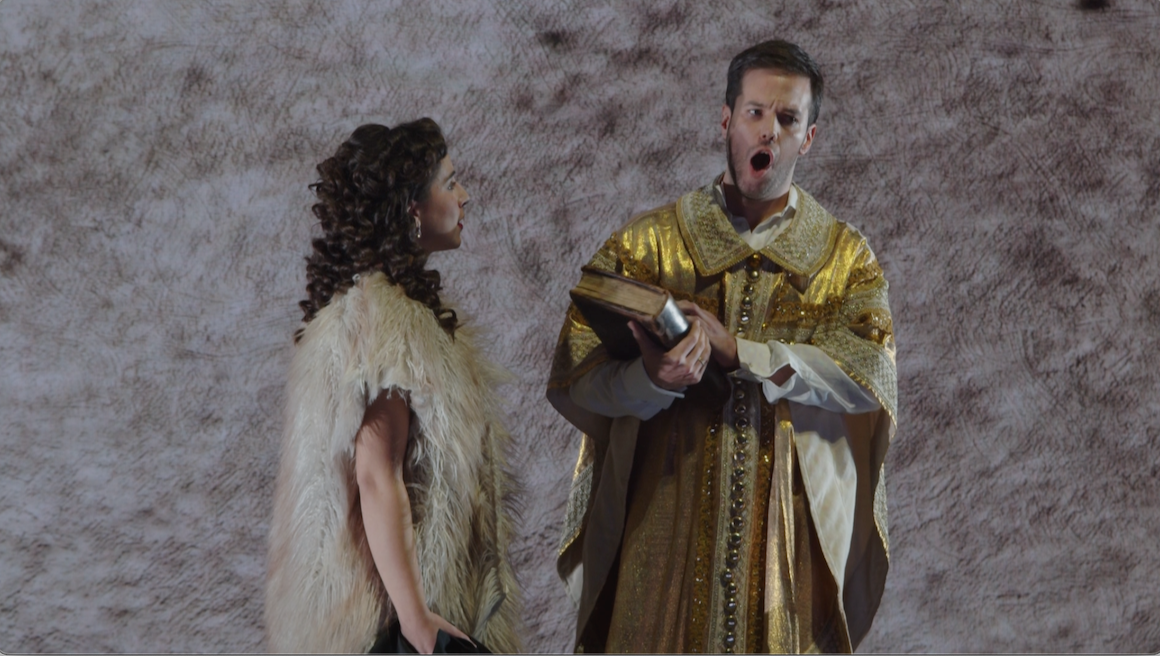
There are weird bits in the libretto that show that its author (Andrea Leone Tottola) had a pretty thin grasp on the subject matter. There are numerous references to Britain, Albion and Britons but I don’t think England or the English or Wessex get a mention. This is further confused by Stefane Simone Pintor’s really weird production.
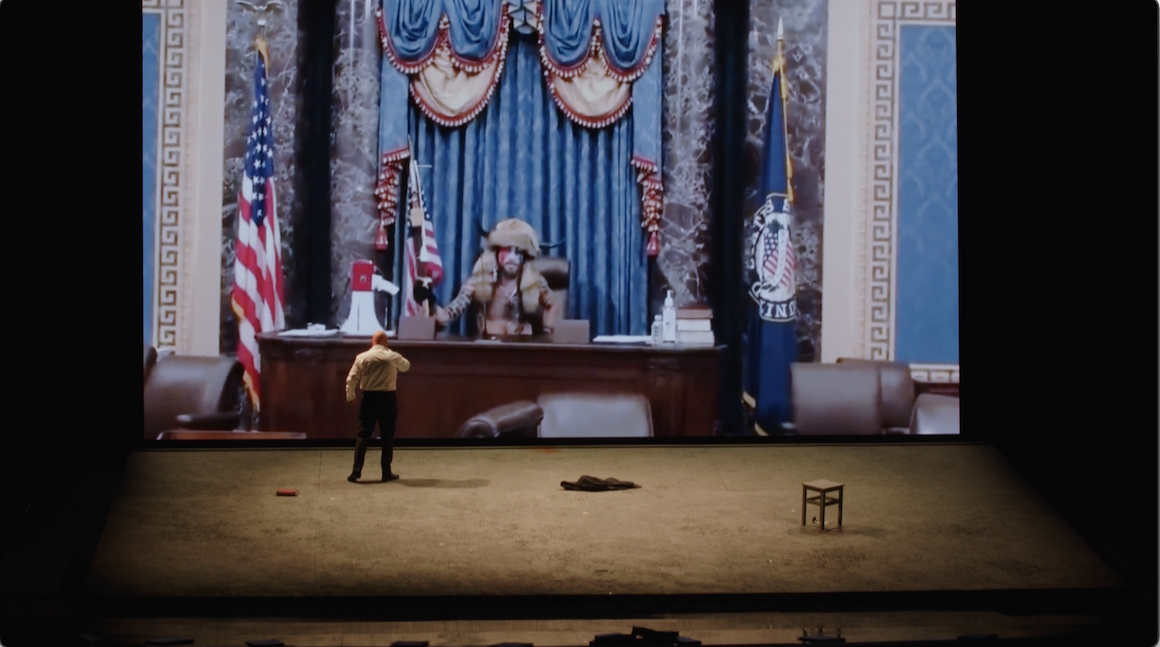
There seem to be two basic ideas in play. The first is an obsession with the Cross of St., George on account of it being boith the English flag and, reversed, the Danish flag. The trouble is that symbolism dates from the Crusades and really doesn’t fit this period especially with the heathen Danes. He also sees some sort of parallel with recent events in the United States so we get projected footage of book burning in Texas and the January 26th riots complete with QAnon Shaman who appears to be the model for the Danes’ costumes.
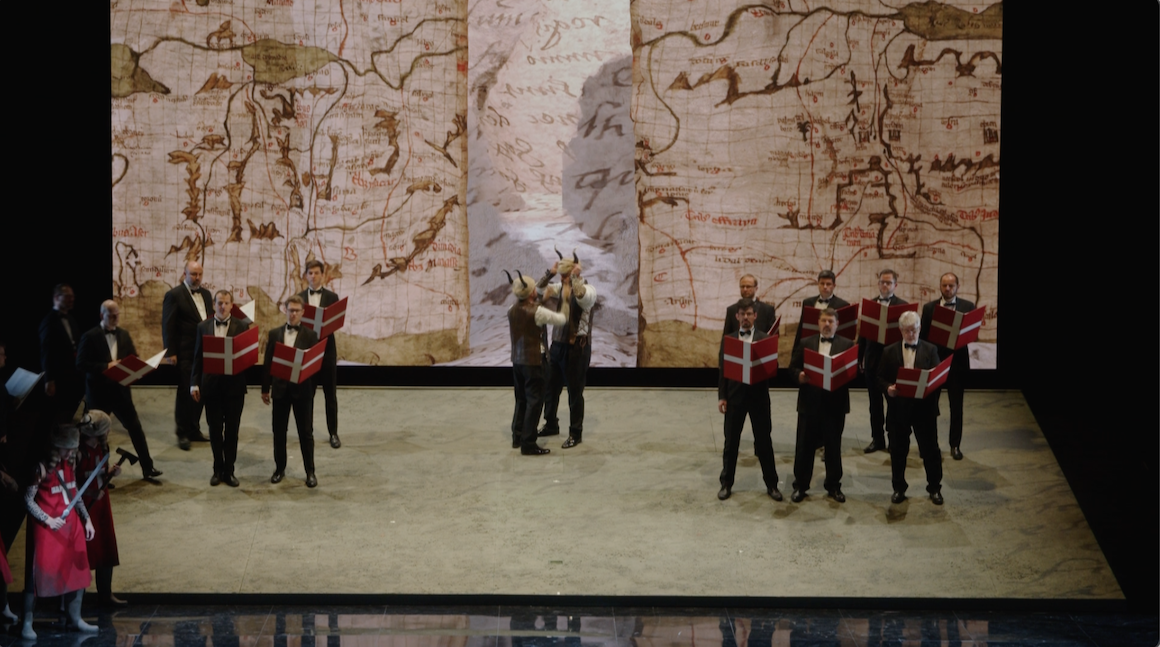
On stage we see a weird mix of modern and vaguely historic. Amalia and Eduardo appear in modern evening dress but put on sheepskins and wellies when they go off to find Alfredo where we discover the shepherd Guglielmo in full Catholic canonicals (did the costume department misread “pastore”?). At times we have young ladies in camo with Red Cross tabards on stage with Crusader style English knights and QAnon Danes. It’s very odd. The chorus mostly sings in evening dress with their scores covered by English or Danish flags as appropriate. The plot, of course, is an incoherent mess and visuals aside mostly what we get is “park and bark”. There’s no attempt to develop the characters as characters because, frankly, they are just cardboard cut outs.
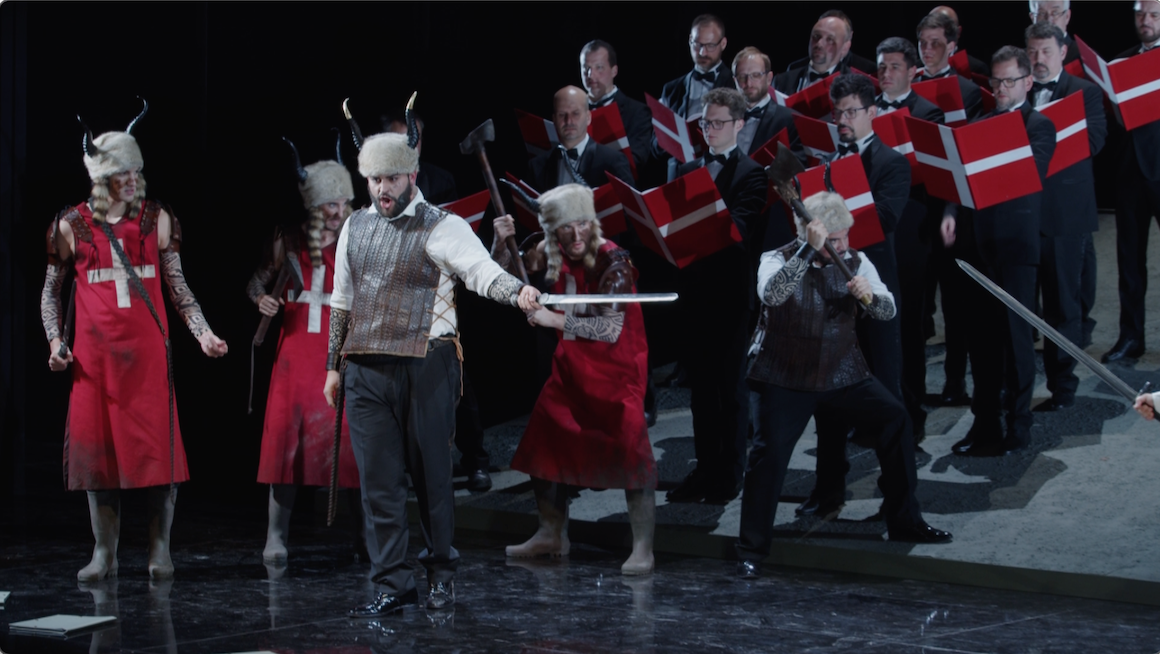
Musically it’s about what you would expect from early Donizetti. I’s competent and the leading singers get some OK numbers. In some ways it’s more like the Tudor Queens operas than Donizetti’s lighter fare. Alfredo calls for a tenor of some heft in the manner of a late Rossini opera seria. Amalia too is quite dramatic. She has a fair bit of coloratura but also requires a fair bit of power. Atkins and Eduardo are both genuine bass roles. Things only lighten up with the lyric tenor Guglielmo and the light mezzo Enrichetta supported by the soubrette Margherita.
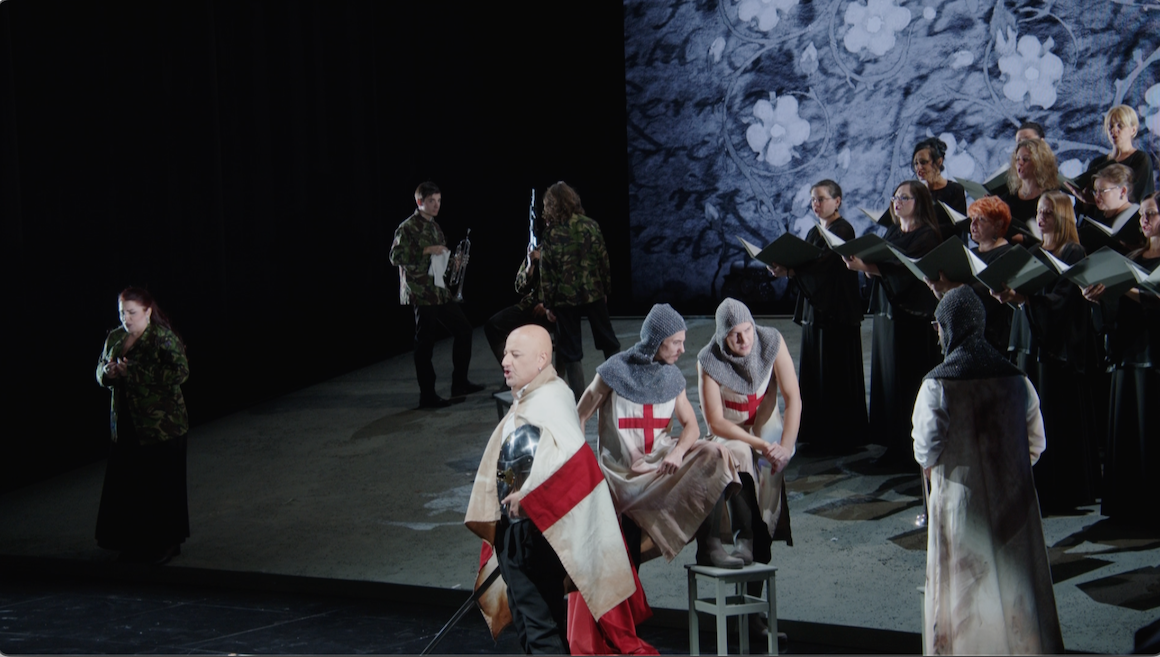
The singing really is the best thing about this disk. Gilda Fiume is a very good Amalia with just the right combination of agility and power. I’d like to hear her sing something like Anna Bolena. Antonino Siragusa is a perfectly competent Alfredo. He’s baritonal in timbre but has the requisite high notes. Ludovico Filippo Ravizza (Eduardo) and Adolfo Corrado (Atkins) are proper basses and there’s some prettier singing from Antonio Garés, as Guglielmo, Floriano Cicio, as Marghareita and, especially, Valeria Giardello, as Enrichetta, who really does have a very sweet mezzo. The perfectly competent chorus is the Hungarian Radio Choir and Corrado Rovaris conducts effectively enough.
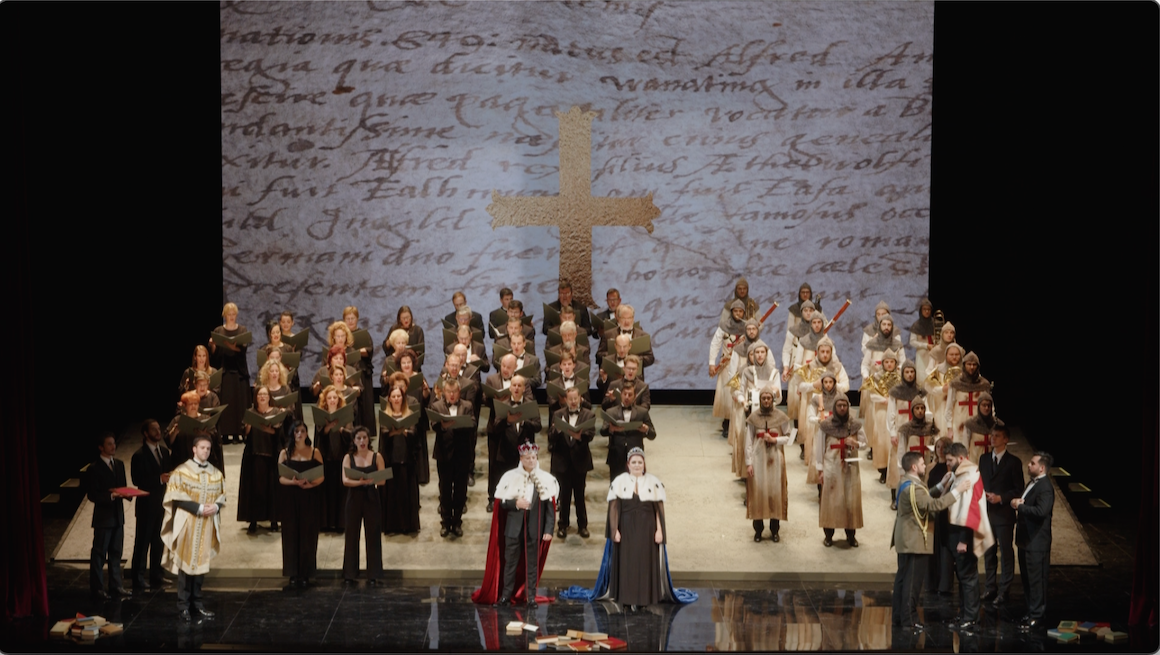
Video direction is by Matteo Ricchetti and I think given the small crowded stage and the importance of the projected backdrops he might have given the production a bit more space but it’s OK. Sound (the usual PCM stereo and DTS-HD-MA) and video are just fine on Blu-ray. There are no extras but the booklet has a synopsis, a track listing and an almost apologetic interview with Rovaris. Subtitle options are English, Italian, French, German, korean and Japanese.
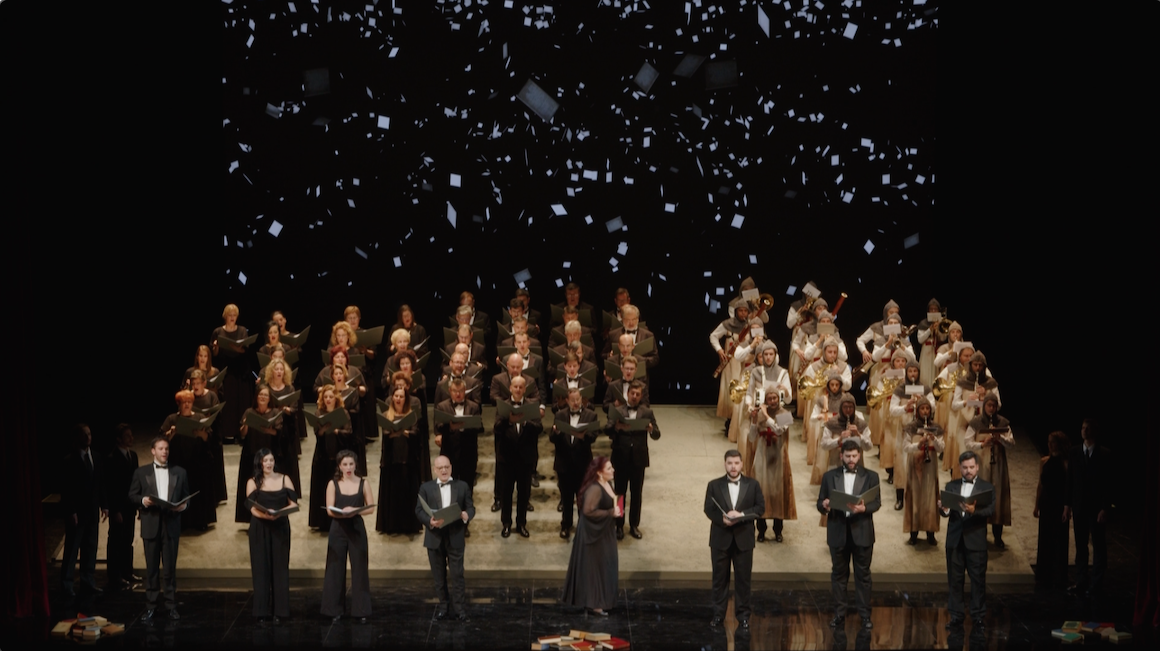
This is one for the Donizetti completist!
Catalogue information: Dynamic Blu-rau DYN58031
